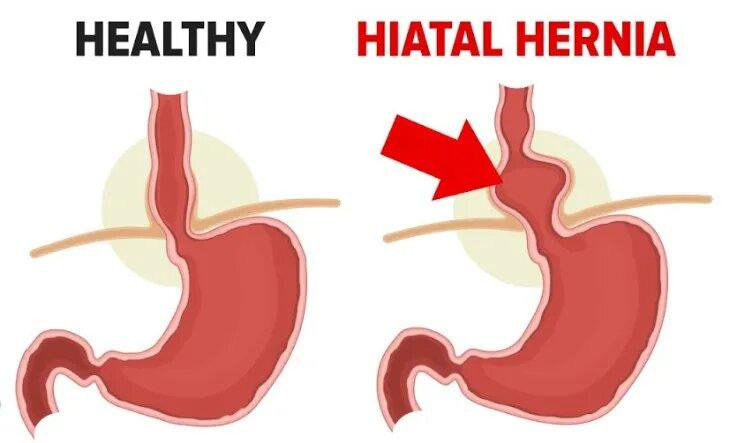A hiatus or hiatal hernia occurs when the upper part of the stomach pushes in to the chest area through a weak diaphragm. Diaphragm is a thin muscle that separates the chest from the abdomen and keeps their respective contents in place. Another important role of this muscle is to help you breathe comfortably.
Treatment For hernia and with different types of hernia, Hiatus Hernia surgery in mumbai is one of the best place for hernia treatment you could find
There is a small hole in the diaphragm called the hiatus. This is the opening though which the oesophagus/food-pipe passes and carries the food into the stomach. A sphincter/valve at the junction of food-pipe and stomach prevents food from going back up into the food-pipe. In case of a hiatus hernia this opening may become lax or the sphincter pressure may decrease. This leads to protrusion of the upper part of the stomach through the hiatal opening leading to GERD. Hiatus hernia can also sometimes occur in children who have a weak diaphragm.
Is Hiatus Hernia surgery important?
Surgery will be required if the condition is severe in such cases surgery becomes necessary in some cases it can be repaired
Hiatus Hernia Symptoms
The most common and well-known symptom of Hiatus hernia is Gastro-Oesophageal Reflux Disease in which the stomach acid travels back up to the oesophagus and causes heartburn, chest pain, problems in swallowing food, an unpleasant sour taste in the mouth, belching and in severe cases it can lead to coughing.
Types of Hiatus Hernia
What causes hiatal hernia is not exactly known and it can be due to a variety of reasons. There are mainly two recognized types of this type of hernia and these include:
- Sliding hiatus hernia: In this type of hernia both the stomach and esophagus keep sliding in and out of the chest region. This type of hernia is the most common one and is often very temporary. Most people don’t even notice it and the most common symptom associated with it is mild to severe acid reflux.
- Para-oesophageal hiatal hernia: In this condition the stomach slides up and then stays there. Apart from the stomach, other organs such as the spleen and pancreas can also protrude upwards. This can cause obstruction and runs a risk of blocking blood flow to the stomach and further complications.
Treatment and Hiatus Hernia Surgery Cost
If you have been facing the problem of acid reflux or acidity or have symptoms of GERD then it is better to consult your doctor for the correct treatment approach to get rid of the problem. The most common treatments used for hiatus hernia are:
- Medications such as antacids to relieve the acid reflux. These include OTC medications and prescription drugs to lower acid production and even prevent acid production
- Lifestyle and diet changes: simple and easy to implement diet and lifestyle changes go a long way in preventing and relieving hiatus hernia. Here are somethings to try
- Eat small meals during the day and eat at least 2-3 hours before going to bed.
- Keep a check on spicy food, chocolates, alcohol, food rich in tomatoes, citrus foods etc. to prevent the hernia from acting up.
- While sleeping keep your head elevated
- Don’t eat lying down
- Exercise regularly and keep a daily routine
- Hiatus hernia surgery or laparoscopic Nissen’s fundoplication is a surgical procedure performed for the treatment of Hiatus Hernia and GERD. Myths and fear of surgery sometimes lead to delay in treatment and may give rise to complications that could have been avoided. This surgery is generally safe and if you are detected with a hiatus hernia, please visit your surgeon for the right advice. Hiatus hernia and GERD (Acid reflux) are more common than we generally think. Taking the decision to undergo surgery is usually difficult. Most of the times when patients come for a consultation with me, they want to know if they are the right candidate for surgery.
- Surgery is advised in the following cases:
- In patients with para-esophageal hernia surgery is routinely recommended. If surgery is not performed early, there can be complications like bleeding, ulceration and perforation.
- If the patient continues to have acid reflux despite being on antacid and anti-reflux medications for more than 3 months, surgery is warranted.
- Inability to withdraw antacid medications is also an indication for surgery.
- Complications of chronic acid reflux such as Barrette’s esophagus are an indication for surgery
- Other complications like hoarseness of voice, cough, asthma like symptoms due to chronic reflux.
- Patient preference- If the patient does not want to be on long term medical therapy or has financial considerations, we may consider surgery as a one-time solution.

